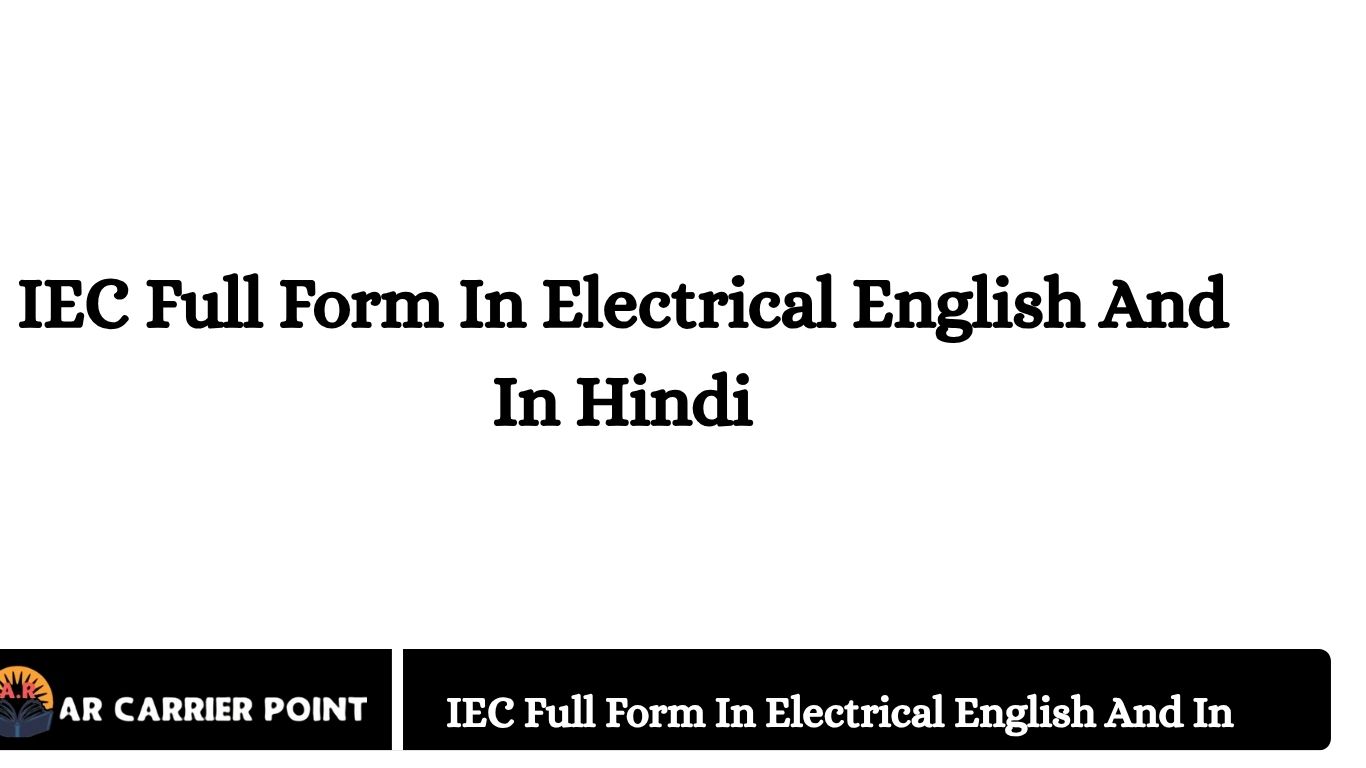IEC Full Form In Electrical English
IEC stands for International Electrotechnical Commission. It is a global organization that prepares and publishes international standards for all electrical, electronic, and related technologies. Established in 1906, IEC plays a vital role in ensuring the safety, reliability, and efficiency of electrical equipment and systems worldwide. In the field of electrical engineering, the IEC is highly significant because it creates common standards that manufacturers, engineers, and consumers follow to ensure compatibility and safety. These standards cover a broad spectrum of electrical components and systems, including power generation, transmission, distribution, electrical appliances, and electronics. The IEC standards help in harmonizing technical specifications for electrical devices across different countries, reducing trade barriers and promoting international cooperation. This makes it easier for companies to manufacture products that can be used globally without modifications. For example, IEC standards define electrical voltages, current ratings, insulation types, and testing procedures for electrical devices to ensure that they function safely and efficiently.
One important aspect of IEC is its work in electrical safety standards, which help prevent electrical accidents, fires, and equipment failures. By adhering to IEC standards, manufacturers ensure that their products meet strict safety requirements, protecting users from electrical hazards. The IEC also works closely with other international organizations, such as the International Organization for Standardization (ISO), to develop joint standards. This collaboration helps create unified standards that cover electrical and electronic technologies comprehensively. In summary, the International Electrotechnical Commission (IEC) is a cornerstone organization in electrical engineering, providing crucial international standards that ensure electrical equipment’s safety, performance, and interoperability worldwide.
IEC Full Form In Electrical Hindi
IEC का फुल फॉर्म “International Electrotechnical Commission” होता है, जिसे हिंदी में “अंतर्राष्ट्रीय वैद्युततकनीकी आयोग” कहा जाता है। यह एक वैश्विक संगठन है जो विद्युत, इलेक्ट्रॉनिक और संबंधित तकनीकों के लिए अंतर्राष्ट्रीय मानक (Standards) तैयार करता है और प्रकाशित करता है। इसकी स्थापना वर्ष 1906 में की गई थी।
इलेक्ट्रिकल इंजीनियरिंग के क्षेत्र में IEC का बहुत महत्वपूर्ण स्थान है क्योंकि यह ऐसे मानक बनाता है जो उपकरणों की सुरक्षा, गुणवत्ता, विश्वसनीयता और आपसी संगतता सुनिश्चित करते हैं। इन मानकों का पालन करके कंपनियाँ ऐसे उत्पाद बना सकती हैं जिन्हें दुनिया भर में आसानी से उपयोग किया जा सके। इससे अंतर्राष्ट्रीय व्यापार को भी बढ़ावा मिलता है और तकनीकी बाधाएं कम होती हैं। IEC द्वारा बनाए गए मानक विद्युत उत्पादन, ट्रांसमिशन, वितरण, उपकरणों की सुरक्षा, वायरिंग, इंसुलेशन, वोल्टेज सीमाएं, और परीक्षण प्रक्रियाओं से संबंधित होते हैं। यह मानक यह सुनिश्चित करते हैं कि उपकरण सुरक्षित रूप से काम करें और उपयोगकर्ताओं को किसी प्रकार का विद्युत खतरा न हो।
Read More: MLC Full Form In Hospital English And In Hindi
Frequently Asked Questions
What is the full form of IEC in electrical?
IEC stands for International Electrotechnical Commission.
What does IEC do?
IEC develops and publishes international standards for electrical, electronic, and related technologies.
Why are IEC standards important?
IEC standards ensure safety, reliability, performance, and global compatibility of electrical products and systems.
Are IEC standards mandatory?
IEC standards are not legally mandatory unless adopted by a country’s regulatory authority, but they are widely followed by manufacturers globally.
How does IEC help in international trade?
IEC standards harmonize technical requirements, making it easier to export and import electrical products across countries.
Which sectors use IEC standards?
Sectors like power generation, electronics, telecommunications, home appliances, and industrial automation use IEC standards.
Who are the members of the IEC?
IEC has national committees from over 170 countries, including technical experts and engineers.
How is IEC different from ISO?
IEC focuses specifically on electrical and electronic standards, while ISO covers broader industrial and commercial standards.
Conclusion
The International Electrotechnical Commission (IEC) plays a vital role in shaping the global electrical and electronics industry by setting universally accepted standards. These standards ensure safety, reliability, and compatibility across products and systems, enabling smoother international trade and innovation. For engineers, manufacturers, and consumers alike, IEC is a cornerstone of quality and safety in the electrical field.The International Electrotechnical Commission (IEC) plays a vital role in shaping the global electrical and electronics industry by setting universally accepted standards. These standards ensure safety, reliability, and compatibility across products and systems, enabling smoother international trade and innovation. For engineers, manufacturers, and consumers alike, IEC is a cornerstone of quality and safety in the electrical field.


